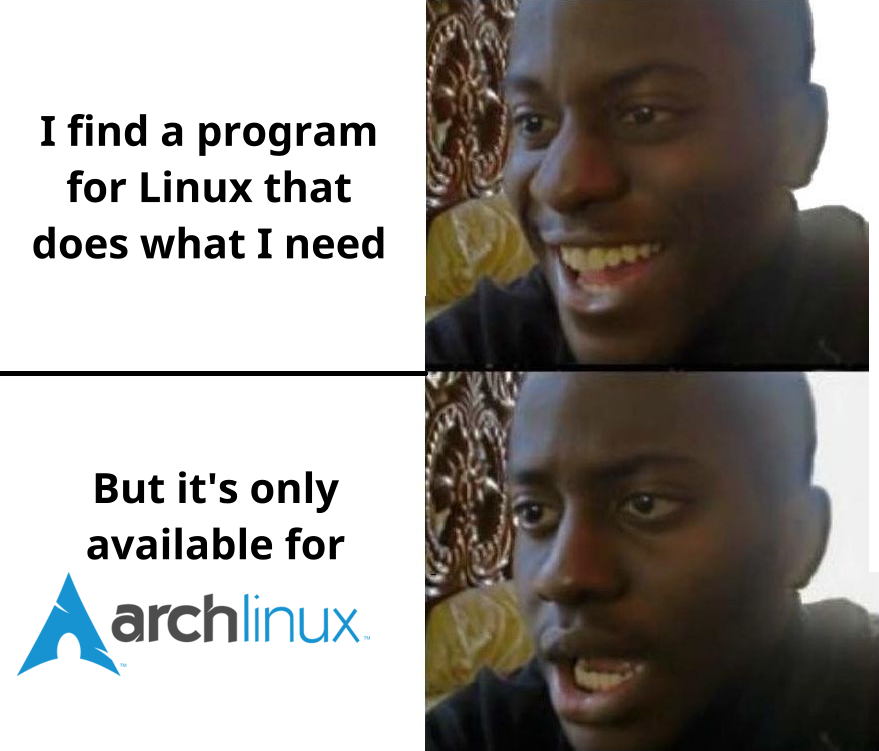this post was submitted on 02 Oct 2023
411 points (94.2% liked)
linuxmemes
21210 readers
50 users here now
Hint: :q!
Sister communities:
- LemmyMemes: Memes
- LemmyShitpost: Anything and everything goes.
- RISA: Star Trek memes and shitposts
Community rules (click to expand)
1. Follow the site-wide rules
- Instance-wide TOS: https://legal.lemmy.world/tos/
- Lemmy code of conduct: https://join-lemmy.org/docs/code_of_conduct.html
2. Be civil
- Understand the difference between a joke and an insult.
- Do not harrass or attack members of the community for any reason.
- Leave remarks of "peasantry" to the PCMR community. If you dislike an OS/service/application, attack the thing you dislike, not the individuals who use it. Some people may not have a choice.
- Bigotry will not be tolerated.
- These rules are somewhat loosened when the subject is a public figure. Still, do not attack their person or incite harrassment.
3. Post Linux-related content
- Including Unix and BSD.
- Non-Linux content is acceptable as long as it makes a reference to Linux. For example, the poorly made mockery of
sudoin Windows. - No porn. Even if you watch it on a Linux machine.
4. No recent reposts
- Everybody uses Arch btw, can't quit Vim, and wants to interject for a moment. You can stop now.
Please report posts and comments that break these rules!
founded 1 year ago
MODERATORS
you are viewing a single comment's thread
view the rest of the comments
view the rest of the comments


I'm a noob, isn't every (open source) program aviable for every distribution if you compile it from source? It's all Linux in the end (i never compiled a program from source, so I don't know if it's easy at all)
Some programs may use libraries or tools specific to a distributions package manager. For example, yay, an AUR helper/pacman wrapper. You would have a very hard time getting it to work on Debian.
Other programs might only include build scripts for a distro specific build system. For example, a program might skip using a Makefile, and do everything in the Arch-specific PKGBUILD.
Generally though, most software uses a standard cross-distro (or even OS) build system. In this case, compiling from source would be an option on any distro. The program might still only be packaged for Arch/NixOS/Gentoo (or others), as it is a very simple process to do so.
Usually the only tricky part of compiling from source is tracking down dependencies. The package manager does that for you normally but you're not using the package manager when compiling from scratch. The actual building (even compiling a kernel) isn't all that complicated.
Usually developers list dependencies in README anyway
True. It's the dependencies of dependencies where the tricky part starts.
Dependencies almost always are present in distro repos. What's tricky?
If you need the python header files, depending on your distro, you may need to install python3-dev, python3-devel, python3, or some other variation on the name. For a novice, this might not always be obvious and they might not know things like
apt-fileare helpful for figuring it out.Huh. Shouldn't apt install header dependencies too? I'm using system where every package comes with headers, so I don't install headers separately.
Debian and RedHat based distros typically do not bundle them together. The have separate
-devand-develpackages for headers.Yes, but not every package is in every repository